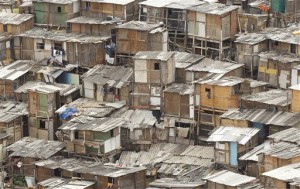
Shack homes crowd the Paraisopolis slum in Sao Paulo, Brazil, in this Nov. 19, 2012, photo. More than 100 people have been arrested during a monthlong anti-crime crackdown in Brazil’s most populous city Sao Paulo focused on Paraisopolis, police said Thursday, Nov. 29, 2012. AP PHOTO/ANDRE PENNER
SAO PAULO, Brazil—More than 100 people have been arrested during a monthlong anti-crime crackdown in Brazil’s most populous city Sao Paulo focused on the notorious slum of Paraisopolis, police said Thursday.
Sao Paulo state Governor Geraldo Alckmin and his new security chiefs on Thursday toured the slum, where more than 500 state military police were deployed in an attempt to end robberies, drug trafficking and weapons sales.
The high-profile operation was launched in response to a wave of violence linked to an undeclared war between the state’s military police force and a powerful prison gang known as the PCC, or First Command of the Capital.
More than 300 people have been killed in Sao Paulo over the past month, with much of the violence blamed on prison gangs seeking revenge against police for anti-drug operations or tougher living conditions inside jails.
Nearly 100 police personnel have been murdered across Sao Paulo state this year, according to official figures.
State security officials said the police sweep in Paraisopolis, home to 80,000 people, led to 107 arrests and also netted 18 firearms, 407 ammunition rounds, 59 kilograms (140 pounds) of cocaine, 344 kilograms of marijuana and 783 grams of crack cocaine.
Colonel Benedito Roberto Meira, the new state military police chief, said his force would now establish permanent bases in Paraisopolis.
But Meira said some of the officers would be redeployed to other crime-ridden communities across the greater Sao Paulo area, home to 20 million people.
Governor Alckmin recently replaced the state security chief as authorities mulled new strategies to contain the violence, which is denting the image of Brazil’s economic capital, which is one of 12 cities that will host the 2014 World Cup.
Targeting PCC gang
Alckmin has announced plans to boost the police force’s intelligence and investigation resources, particularly to target the PCC gang.
Formed in 1993 by inmates in the Taubate maximum security prison near Sao Paulo, the PCC is believed to have ordered the murder of police officers while directing drug trafficking and other crimes from within state prisons.
In 2006, a wave of attacks attributed to the PCC paralyzed Sao Paulo and left more than 170 people dead in a month.
In a related development, Human Rights Watch on Thursday appealed to Brazilian states to curb all unlawful killings by their police forces.
“Police officers in many parts of Brazil face real difficulties and dangers when confronting violent crime, and many of them have lost their lives in the line of duty,” said Jose Miguel Vivanco, Americas director at Human Rights Watch.
“Unfortunately, their legitimate efforts to enforce the law have often been undermined by other officers who themselves engage in unlawful violence, executing people and falsely claiming their victims died in shootouts,” he added.